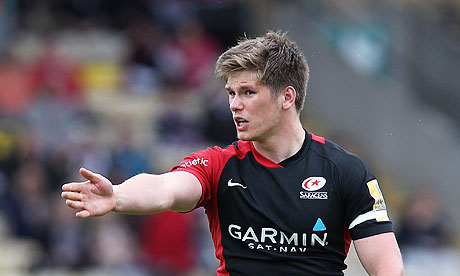
History, believe it or not, points to an English winner of the Heineken Cup next May. The final is being played at Twickenham for the fourth time since the tournament's inception in 1996 and a Premiership club has lifted the trophy on all three previous occasions. It is a neat statistic with one major snag: the route to every final is littered with the debris of teams who peeked too far ahead.
Still, it is a positive incentive for those English rugby union supporters who continue to wear their World Cup sackcloth. If Saracens, Harlequins, Northampton or Leicester, the main standard-bearers this year, feature in May it will suggest the World Cup was a beneficial exercise after all, the excesses of a few having concentrated the majority of minds across the country.
There also seems to be a trend for French sides – Toulouse excepted – to take a while to regather their optimum strength following a World Cup. In both 2004 and 2008 the Gallic challenge flattered mostly to deceive, with London Wasps and Munster emerging victorious. All too often the French sides overlook how important the early pool fixtures can be. Playing catch-up in Europe is the toughest ask of all.
By that logic, there should be some scope for the English, Irish and Welsh if they can start well. Leinster, quite rightly, deserve enormous respect as they seek their third title in four years but on this occasion there has to be a caveat: can they be as formidable without the injured Brian O'Driscoll, their steely midfield protector? Rugby is not a one-man game but, once or twice in a generation, that law stretches to breaking point.
Leinster should still win their pool; their outstanding defensive qualities make them doughty opponents, particularly at home. Increasingly this is where the real secret of European success lies. Toulouse, Leinster, Munster – and recent finalists Leicester and Northampton – all have loud, passionate and widespread support, enough to sway games that might be slipping away. The definition of a top-class European team these days is one that attracts 20,000-plus supporters on a regular basis.
This, rather than any lack of talent, may explain why the record of the Welsh regions in this tournament has generally been so mediocre. There is no reason why Scarlets, Ospreys and Blues cannot have a serious tilt this time, other than a subconscious feeling of inferiority when they go to Toulouse or Clermont or any of the other rich-list clubs. A good early test will come when Racing Métro, with Juan Martín Hernández back at fly-half, host the Blues in Paris on Friday night. The Cardiff side have Sam Warburton, Jamie Roberts, Leigh Halfpenny, Gethin Jenkins and Bradley Davies; an away win would electrify not only Pool Two but the entire competition. Unpopular as it may be, Racing are still likely to top the pool and their young Argentinian wing Juan Imhoff to emerge as one of the winter's sharpest finishers.
Toulouse and Clermont also look solid bets for the last eight but Pool One looks to be a dog-fight before a ball is kicked. Any away win will be priceless, which may just favour teams with a sharper attacking edge. Northampton and Scarlets would fancy themselves in that regard, with the Saints driven on by the sweet and sour memories of last season's campaign. Their opening two games, starting in Limerick this weekend, will be defining moments. Win both and they will surely prosper, unless the outstanding young Scarlets winger George North intervenes.
Keep an eye out, too, for Harlequins. Their victory in last season's Challenge Cup final has, by common consent, given them the confidence to take their game to a whole new level. Still unbeaten this season in 10 domestic matches, they will fancy extending the sequence against Connacht and giving Toulouse a run for their euros in their home and away ties in December. With the Italian teams improving yearly, two teams may yet make it through from Pool Six, although Gloucester's young side are on a promising upward curve.
If one English team are primed to shake up the establishment, however, they are probably Saracens. They have developed a taste for European knockout rugby and were unlucky in a brutal pool last season. The breadth of their ambition is evident in their decision to play Biarritz on 14 January at the 55,000-capacity Cape Town Stadium, the first time a Heineken Cup match will have been staged outside Europe. If they can provide the rugby to match the backdrop, it could propel the club game into a whole new orbit. To boldly go from Table Mountain to Twickenham would be some trek.
With the Challenge Cup also growing in profile – James Hook's home debut at fly-half for Perpignan against Exeter Chiefs will arouse interest in at least three countries – there is certainly no shortage of incentive.
It is possible to imagine three English and three French representatives, plus one apiece from Wales and Ireland, in the last eight but May is a distant speck. Saracens v Clermont is a tentative final forecast, by which point the roar of history in English eardrums will be irresistible.

